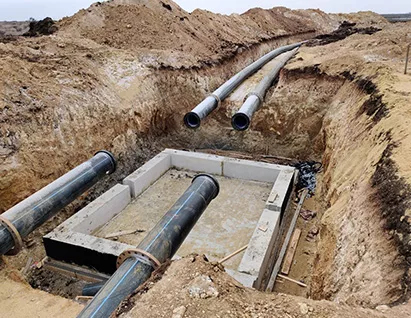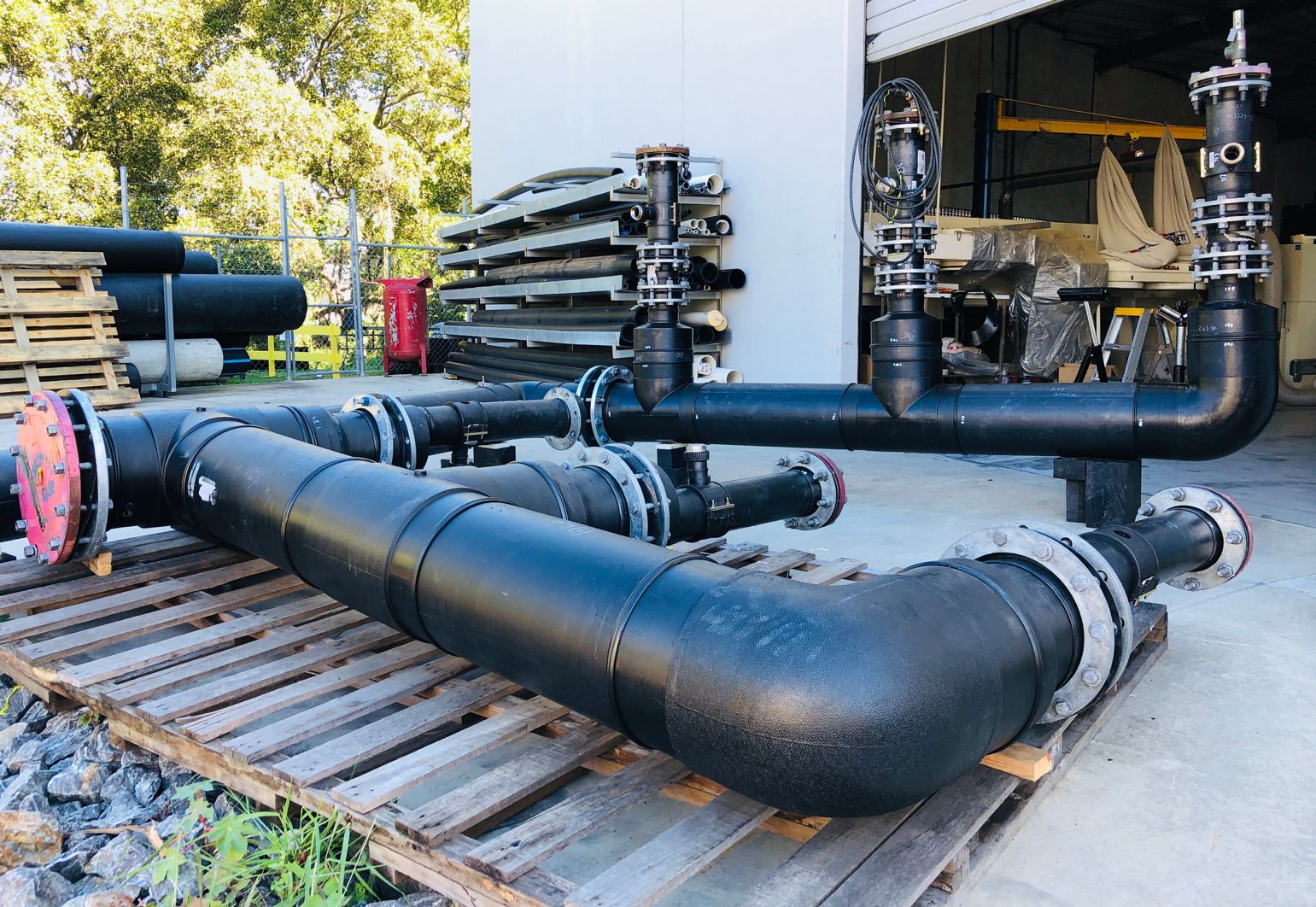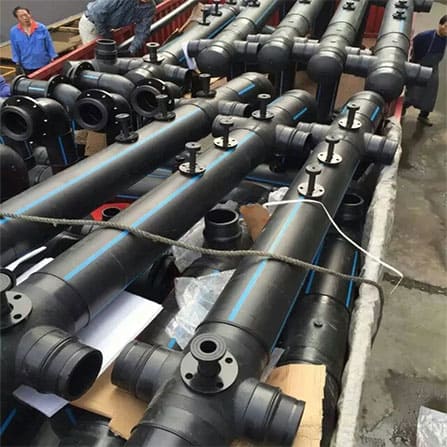Discovering the Leading Pipeline Manufacturers: Top Quality, Dependability, and Technology
The pipeline manufacturing sector stands at the junction of dependability, high quality, and development, driven by leading companies such as Tenaris and Vallourec. These makers are not only devoted to producing high-performance products yet are additionally introducing lasting techniques that deal with modern ecological worries (HDPE Pipe Supplier). As we examine the criteria that specify quality in pipeline remedies, it ends up being apparent that the landscape is rapidly evolving. What certain developments are arising, and just how are these innovations forming the future of pipeline facilities? The answers might redefine market criteria in manner ins which are not yet completely comprehended
Leading Manufacturers Overview
In the domain name of pipeline manufacturing, several principals become leaders, each contributing substantially to the sector's landscape. Companies such as Tenaris, Vallourec, and JFE Steel have actually developed themselves as frontrunners by consistently supplying high-quality products that satisfy stringent industry standards. Tenaris, renowned for its innovative remedies, focuses on seamless and bonded pipes, providing largely to the oil and gas industry. Vallourec, a French multinational, concentrates on the manufacturing of premium tubular remedies, stressing sustainability and progressed modern technology in its manufacturing procedures.
JFE Steel, a major Japanese manufacturer, is acknowledged for its considerable array of steel pipes, particularly those made use of in energy and facilities jobs. Their dedication to r & d has enabled them to generate high-performance products that stand up to extreme environmental conditions. In addition, companies like united state Steel and National Oilwell Varco have expanded their market visibility by expanding their item offerings and boosting operational efficiencies.
These leading suppliers not only control the market however also drive technology within the market, setting criteria for high quality and integrity that other players aspire to accomplish. Their payments are crucial for fulfilling the enhancing need for reliable and durable pipeline options worldwide.
Standards for Top Quality Evaluation
Quality assessment in pipeline manufacturing hinges on two critical requirements: material durability criteria and producing process efficiency. Making certain that products satisfy rigorous toughness criteria is crucial for the long life and dependability of pipelines. Additionally, optimizing the manufacturing procedure can enhance efficiency while maintaining high top quality, inevitably influencing general efficiency and safety.
Product Toughness Criteria
Ensuring the longevity and dependability of pipeline products is crucial for preserving infrastructure stability and functional effectiveness. Material resilience standards play an important duty in evaluating the quality of pipes, dictating the efficiency and life expectancy of the materials utilized in construction. Manufacturers have to comply with a variety of rigorous requirements, including those set by companies such as ASTM International and the American Petroleum Institute (API)
These requirements examine various aspects, consisting of rust resistance, tensile strength, and exhaustion performance. As an example, pipes made use of in harsh settings need materials that can stand up to chemical destruction, while those subjected to high-pressure problems need to exhibit outstanding tensile strength.
Furthermore, factors such as temperature level fluctuations and ecological conditions should be thought about, as these can greatly influence material behavior gradually. Manufacturers commonly utilize innovative testing methodologies, including accelerated aging tests, to mimic long-lasting wear and guarantee that materials exceed or fulfill industry standards.
Manufacturing Process Performance
Manufacturers' ability to enhance manufacturing process efficiency is important for generating top quality pipelines that fulfill strict industry criteria. Performance in producing directly affects price administration, manufacturing timelines, and overall item integrity. To attain this, leading pipeline makers apply innovative techniques such as lean manufacturing, automation, and real-time information analytics.
Lean making concepts are necessary in minimizing waste and maximizing resource usage. By improving procedures and getting rid of redundancies, producers can enhance productivity while making sure constant high quality. Automation technologies, including robotics and computer system numerical control (CNC) machines, play a critical role in improving accuracy and minimizing human error, thereby elevating the integrity of the final item.
Additionally, making use of real-time information analytics permits makers to monitor production procedures continuously, allowing them to recognize bottlenecks and make timely adjustments. This proactive strategy not just improves performance yet likewise sustains top quality assurance protocols by making certain conformity with regulatory requirements.
Dependability in Pipeline Solutions
Dependability in pipeline services is paramount, as it straight impacts the safety and security and effectiveness of liquid transportation systems. Secret elements consist of the sturdiness of products made use of, adherence to strenuous testing and qualification requirements, and the unification of innovative material services that boost efficiency. Understanding these components is necessary for manufacturers intending to provide reliable pipeline framework.
Importance of Sturdiness
Achieving sturdiness in pipeline options is important, as it straight influences the long-term performance and safety and security of infrastructure. Durable pipes are crucial for decreasing upkeep expenses and decreasing the chance of tragic failings. This dependability is specifically crucial in markets such as oil and gas, water system, and wastewater monitoring, where the effects of pipeline failure can be severe, both economically and eco.
The products and manufacturing procedures employed by pipeline manufacturers play a substantial function in figuring out the sturdiness of the end product. Making use of premium basic materials, advanced innovations, and ingenious style principles ensures that pipelines can hold up against different stressors, including pressure fluctuations, temperature level variations, and destructive atmospheres.
Furthermore, the resilience of pipelines is carefully linked to their capacity to resist external aspects such as soil activity, seismic activity, and chemical direct exposures. Effective deterioration protection approaches, such as layers and cathodic protection, additionally improve the longevity of pipelines, protecting them versus deterioration in time.
Buying resilient pipeline services ultimately converts to boosted operational efficiency, reduced downtime, and boosted security, attesting the critical relevance of longevity in contemporary pipeline manufacturing.
Examining and Accreditation Specifications
In the domain name of pipeline remedies, rigorous testing and accreditation criteria are vital to ensure the reliability and security of infrastructure. These standards function as standards for assessing the efficiency and sturdiness of pipeline products and systems, verifying they fulfill specific regulatory and market requirements.
Checking procedures typically encompass different techniques, including stress testing, hydrostatic analyses, and non-destructive testing strategies. These assessments are necessary for identifying prospective weak points or problems in the products prior to they are deployed in real-world applications. Furthermore, certification by acknowledged companies assurances that makers comply with developed guidelines, which promotes count on among stakeholders, consisting of end-users, designers, and specialists.
Many top pipeline makers take part in continual surveillance and improvement of their testing procedures to adjust to progressing sector criteria and technological developments. Compliance with requirements such as ASTM, ASME, and ISO not just boosts product dependability however also reduces the threat of environmental cases connected with pipeline failings.
Cutting-edge Material Solutions
The growth of cutting-edge product options has actually changed the landscape of pipeline manufacturing, boosting both efficiency and longevity. Advanced products such as high-density polyethylene (HDPE), cross-linked polyethylene (PEX), and composite products have actually arised as game-changers, providing exceptional resistance to corrosion, temperature variations, and stress variants. These materials not only extend the life-span of pipes however additionally reduce upkeep expenses, making sure reputable long-lasting efficiency.
Additionally, producers are significantly taking on smart products that include sensing units for real-time surveillance. This technology enables for aggressive maintenance, significantly boosting reliability by finding leakages or architectural weak points before they rise into crucial failings. The combination of nanotechnology has additionally caused the development of layers that improve the resilience of pipes versus abrasion and chemical exposure.
Sustainability is another crucial focus, with manufacturers checking out bio-based compounds and recyclable products that reduce ecological effect. As governing requirements remain to develop, the focus on ingenious material services ends up being paramount in meeting rigid safety and ecological requirements. Eventually, these innovations not only improve the integrity of pipeline systems but likewise add to the general performance and sustainability of energy transportation facilities.
Advancements in Pipeline Technology
Developments in pipeline innovation are changing the industry by enhancing efficiency, safety and security, and ecological sustainability. Recent improvements concentrate on clever pipeline systems that use sensors and IoT technology to keep an eye on conditions in actual time, enabling aggressive maintenance and minimizing the danger of failures. These systems can identify leaks, stress modifications, and other abnormalities, enabling for rapid feedback and decreasing ecological influence.
Additionally, the growth of advanced materials, such as corrosion-resistant and composite alloys, substantially prolongs the lifespan and dependability of pipes. Pipeline Manufacturer (Texas Pipeline Manufacturer). These materials lower maintenance prices and improve performance in severe settings, making them ideal for oil, water, and gas transport
Automation and robotics are playing a crucial function in pipeline construction and examination. Drones and robotic devices promote surveys and assessments of hard-to-reach areas, ensuring comprehensive examinations without endangering safety.
In addition, innovative layouts, such as modular pipeline systems, permit for higher flexibility in installation and alteration, accommodating the dynamic requirements of the energy market. With each other, these technological innovations not only boost functional efficiency yet likewise add to an extra durable and lasting pipeline framework, leading the way for a greener future.
Study of Success
Across various industries, effective implementations of sophisticated pipeline modern technologies show considerable enhancements in operational performance and safety and security. One noteworthy situation Check Out Your URL is the release of smart pipeline surveillance systems in the oil and gas market, where real-time information analytics have actually decreased leakage discovery times by over 50%. This not just reduces environmental threats but additionally improves the total integrity of pipeline facilities.

Furthermore, a major manufacturer applied robotic examination innovations in its pipeline upkeep procedures, resulting in a 40% improvement in assessment performance. This strategy has structured upkeep routines and significantly decreased downtime.
These situation studies highlight just how prominent pipeline manufacturers are leveraging cutting-edge innovations to foster integrity and functional excellence, ultimately establishing brand-new requirements for the industry. As these successes remain to unravel, they lead the way for additional improvements in pipeline manufacturing and management.

Ecological Sustainability Practices
Regularly, pipeline manufacturers are prioritizing environmental sustainability practices to alleviate their eco-friendly impact and enhance the longevity of their products. This commitment is shown in numerous efforts targeted at reducing waste, conserving energy, and utilizing sustainable materials throughout the manufacturing process.

Lots of manufacturers are adopting advanced innovations that reduce emissions and power usage. For circumstances, the assimilation of automated systems and energy-efficient equipment helps simplify production while lowering dependence on nonrenewable fuel sources. In addition, companies are increasingly turning to environmentally friendly materials, such as recycled metals and bioplastics, which not only lower the environmental influence yet likewise promote a round economic situation.
In addition, pipeline makers are carrying out rigorous lifecycle analyses to review the environmental implications of their items from inception to disposal. This approach allows them to identify chances for improvement and foster responsible sourcing and waste management practices.
Partnership with environmental companies further improves these efforts, as makers look for to align their procedures with worldwide sustainability objectives. Ultimately, these ecological sustainability practices not only add to a healthier earth but additionally setting manufacturers as liable leaders in the industry, appealing to environmentally conscious stakeholders and consumers alike.
Future Trends in Pipeline Manufacturing
As the need for extra efficient and lasting framework grows, pipeline manufacturing is positioned for significant innovations that will reshape the market. Key patterns expected in the coming years consist of the combination of innovative products, such as composite and corrosion-resistant alloys, which improve longevity while reducing ecological influence. Manufacturers are additionally expected to adopt ingenious production strategies, like additive manufacturing and automation, to streamline processes, decrease waste, and reduced prices.
The rise of clever pipeline technologies, incorporating sensors and IoT gadgets, will enable real-time tracking and anticipating maintenance, thereby improving safety and security and functional performance. This electronic improvement will not only optimize source monitoring however likewise help with compliance with strict environmental laws.
Sustainability will certainly stay a central focus, driving suppliers to spend in environment-friendly methods, consisting of energy-efficient manufacturing methods and reusing initiatives. As the worldwide emphasis on climate adjustment increases, pipeline suppliers will require to adapt by establishing remedies that meet both financial and ecological demands.
Frequently Asked Inquiries

What Industries Primarily Make Use Of Pipeline Products From These Manufacturers?
Pipeline products are primarily used in industries such as oil and water, gas and wastewater monitoring, chemical mining, construction, and processing. These markets rely upon reliable, long lasting, and safe transportation of products and liquids.
Just How Do Manufacturers Make Certain Conformity With International Pipeline Criteria?
Manufacturers guarantee compliance with international pipeline criteria by applying strenuous quality assurance procedures, carrying out normal examinations, adhering to well established governing frameworks, and spending in worker training to advertise awareness and understanding of safety and top quality requirements.
What Is the Average Life-span of Pipelines From Leading Manufacturers?
The typical life expectancy of pipelines from leading producers normally varies from 30 to 100 years, depending on product, ecological conditions, and maintenance techniques. American Plastics LLC HDPE Pipe Solutions. Normal examinations and adherence to sector requirements significantly influence long life and performance
Exist Certifications Certain to Pipeline Production High Quality?
Yes, numerous certifications exist for pipeline manufacturing top quality, consisting of ISO 9001 for high quality management systems and API criteria particular to pipes. These qualifications ensure adherence to strenuous safety and security, efficiency, and environmental criteria within the market.
Just How Do Manufacturers Manage Pipeline Upkeep and Fixes?
Manufacturers generally carry out a proactive upkeep approach that consists of regular examinations, checking systems for early detection of concerns, and a structured fixing method. This technique assurances pipeline integrity, lessens downtime, and enhances general functional effectiveness.
Quality evaluation in pipeline manufacturing hinges on 2 crucial requirements: product toughness requirements and making process effectiveness - HDPE Pipe Supplier. Material longevity standards play a crucial duty in evaluating the quality of pipelines, determining the performance and life expectancy of the products utilized in construction. The products and producing procedures used by pipeline producers play a considerable duty in determining the sturdiness of the final item. The ordinary lifespan of pipelines from leading producers normally varies from 30 to 100 years, depending on product, ecological problems, and maintenance practices. Yes, various accreditations exist for pipeline producing top quality, consisting of ISO 9001 for top quality monitoring systems and API criteria specific to pipelines